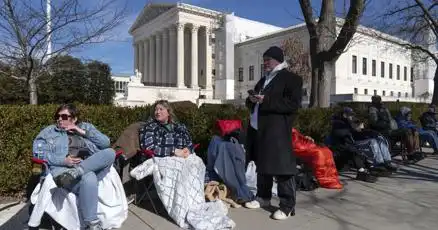Supreme Court skeptical efforts kick Trump ballot Capitol attack
The Supreme Court is skeptical of efforts to keep Trump off the 2024 ballot, raising questions of insurrection and eligibility.
The Supreme Court heard arguments on Thursday about whether former President Donald Trump should be disqualified from the 2024 ballot due to his actions following the 2020 election, including the January 6, 2021, attack on the U.S. Capitol. Both conservative and liberal justices expressed skepticism about the efforts to prevent Trump from running for president again. They raised concerns about whether Congress must pass legislation before states can invoke a constitutional provision that prevents former officeholders who "engaged in insurrection" from holding office again. The justices also questioned whether the provision applies to the president.
The justices seemed open to the arguments made by Trump's lawyer, Jonathan Mitchell, with only Justice Sonia Sotomayor indicating that she might vote to uphold a Colorado Supreme Court ruling that found Trump ineligible to be president. The case marks the first time the justices are considering Section 3 of the 14th amendment, which sets up a case that the court usually avoids, one in which it is the final arbiter of a political dispute.
Trump's lawyers argue that the amendment cannot be used to keep him off the ballot for several reasons, including that the Capitol riot was not an insurrection and that the wording of the amendment excludes the presidency and candidates running for president. They also argue that Congress must pass legislation to reinvigorate Section 3. On the other hand, the lawyers for Republican and independent voters who sued to remove Trump's name from the Colorado ballot counter that there is ample evidence that the events of Jan. 6 constituted an insurrection and that Trump incited it. They argue that it would be absurd to apply Section 3 to everything but the presidency or that Trump is somehow exempt and that the provision needs no enabling legislation.
A definitive ruling for Trump would largely end efforts in Colorado, Maine, and elsewhere to prevent his name from appearing on the ballot. However, a decision upholding the Colorado decision would declare that Trump did engage in insurrection and is barred by the 14th Amendment from holding office again. This would allow states to keep him off the ballot and imperil his campaign. The court has signaled that it will try to act quickly, shortening the period in which it receives written briefing and holds arguments in the courtroom.
The issues may be novel, but Trump is no stranger to the justices, three of whom he appointed. They have considered many Trump-related cases in recent years, declining to embrace his claims of fraud in the 2020 election and refusing to shield tax records from Congress and prosecutors in New York. The court is expected to deal with another appeal from Trump, who is seeking an emergency order to keep his election subversion trial on hold so he can appeal lower-court rulings that he is not immune from criminal charges.
The court last played so central a role in presidential politics in its 5-4 decision that effectively ended the disputed 2000 election in favor of George W. Bush. Justice Clarence Thomas is the only member of the court who also took part in Bush v. Gore. Thomas has ignored calls by some Democratic lawmakers to step aside from the case because his wife, Ginni, supported Trump's effort to overturn the 2020 election results and attended the rally that preceded the storming of the Capitol by Trump supporters.











Comments on Supreme Court skeptical efforts kick Trump ballot Capitol attack